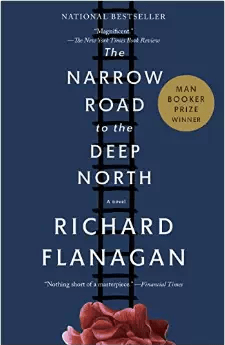 Don’t expect good cheer and humor from The Narrow Road to the Deep North. It is the often harrowing novel based on the experiences of Richard Flanagan’s father as a POW during World War II, one of the hundreds of thousands of Australian soldiers forced to build a railroad through Burma with not much more than their bare hands. A much-sanitized version of this story was the basis for The Bridge on the River Kwai.
Don’t expect good cheer and humor from The Narrow Road to the Deep North. It is the often harrowing novel based on the experiences of Richard Flanagan’s father as a POW during World War II, one of the hundreds of thousands of Australian soldiers forced to build a railroad through Burma with not much more than their bare hands. A much-sanitized version of this story was the basis for The Bridge on the River Kwai.
Dorrigo Evans is the main character of the novel, a surgeon who ends up being in charge of the prisoners simply by virtue of not having died. We meet him first as an older man, one of Australia’s greatest war heroes, feeling no self-worth, unhappily married, and unfaithful to his wife. The novel moves back and forth in time between the days when he is waiting to be shipped overseas at the beginning of the war until his death years later. In the summer before he went to war, we learn, he fell madly in love and had an affair with his uncle’s young wife Amy.
I think it is interesting that the New York Times reviewer thought this affair was a huge flaw in the novel while the Washington Post reviewer thought it was beautiful. I agree with neither of them (although I lean more toward the Times reviewer’s opinion) but think the Times reviewer was off base in blaming the affair for keeping Dorrigo from pulling his life together after the war. It wasn’t the affair at all but the memory of the decisions Evans was forced to make during the war. At one point, he must decide whether to try to save Darky Gardiner an undeserved beating or try to save another man’s leg. Both die, and the later revelation of Darky’s true identity makes this more painful. At another point Dorrigo is made to decide which of his starving, disease-ridden men must march 100 miles north of the camp. He picks the men with boots, reasoning they might have a chance of making it alive.
Occasionally, we see the thoughts of the men’s captors, the Japanese officers or Korean guards. In all his life after, only for a moment does the Japanese Major Nakamura have the slightest doubt of his behavior during the war. To him, the Australian soldiers had shamed themselves by surrendering and were being given a chance to redeem themselves by serving the Emperor. We occasionally also get glimpses of the brutality of mind that characterizes the Japanese military.
Whether you like this book or not, it is not one you will soon forget. This novel won the Booker Prize last year. Although I preferred several of the other short- and long-listed books for the prize, I still found it compelling reading.
Related Posts
Unbroken: A World War II Story of Survival, Resilience, and Redemption

This sounds horrific, and along the lines of some of the stuff that goes on in Unbroken. I do think I’ll add it to my list of war books, though, because sometimes I’m in the mood to be devastated. Interesting to hear a bit about what the reviewers said about it.
Hmm, it isn’t really brutal, even though there are some brutal acts in it. I don’t really know how to explain. I think Unbroken was much harder to read. Maybe because it also focuses on the romance and the hero’s later life it isn’t so bad. It certainly doesn’t describe the day-to-day life in the camp, but more signification incidents. I would describe the whole tone of the novel more as sort of depressed. It made me wonder how biographical it was and whether Flanagan was describing his own father’s life, not just what it was like for him during the war. I don’t want to give the impression that the novel is a downer either, though.
Interesting. I’ve not read Unbroken–though I greatly admire the courage of the man, of course–because I have some sense of what I’d be reading and I’m not ready to read that about a real-life person just yet. This book sounds like it’d be easier to take.
I agree with Naomi–interesting to see that two prominent reviewers had such different positions!
I can’t explain, but there’s something about the way it’s told that makes it not so hard to read as you’d expect. I guess that’s all I can say. And when I said it was depressed, I meant that the main character is depressed during almost all of the novel.
That gives me a good sense of it – thanks!
I think it was on NPR that Richard Flanagan recently talked about his father and the connection to this book. I was in the car and couldn’t hear the whole thing, but it’s worth looking up if you didn’t catch it.
I would love to read this book but worry if it is too difficult violence-wise. But you mention that it wasn’t so bad…?
I didn’t feel it was that bad, but I might have a different sensibility. The thing is, the focus wasn’t always on the camp.
I was fortunate enough to hear Richard Flannigan speak at the Sydney Writers Festival recently, and having read the book prior (I’m a mad Bookers Prize geek), having the author discuss how the book came to be was wonderful. I had so much more of an appreciation of the book.
That must have been very interesting.